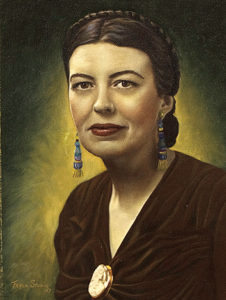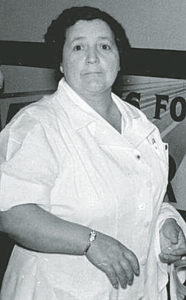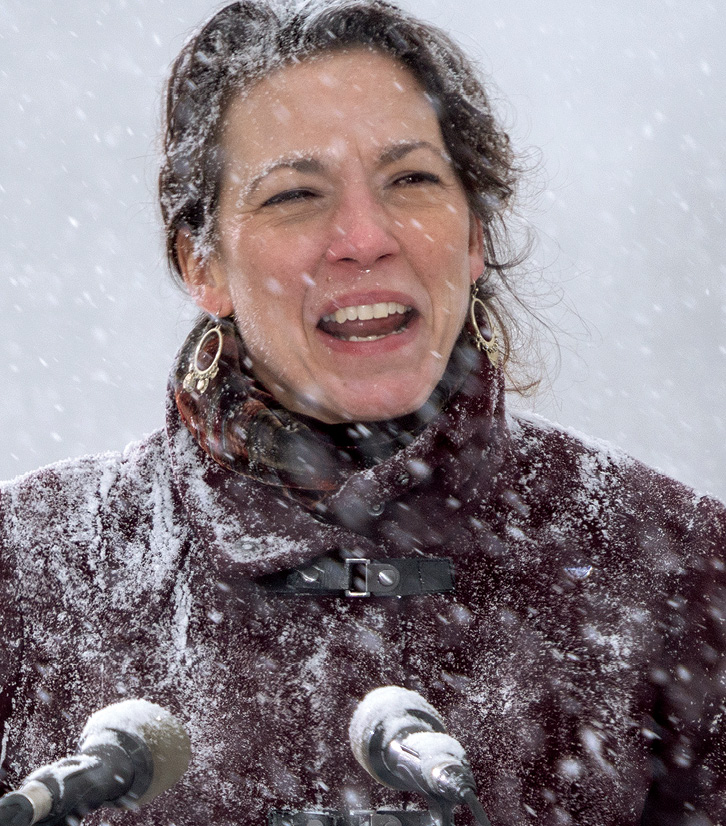Trailblazing women. That’s an appropriate term for women who break trail into previously male-dominated fields. Here’s a snapshot look at some trailblazing first female mayors from both sides of the border.
It took 138 years from the date that Duluth was incorporated as a city in 1878 before a woman became its mayor. On November 3, 2015 in the general election for mayor, Emily Larson won 71.94 percent of the votes. On January 4, 2016 she took the oath of office as the first female mayor in Duluth’s history.
As reported in the Duluth News-Tribune (December 24, 2016), she said at her inauguration, “I stand on the shoulders of generations of women—strong, determined and bold—who have created courageous paths of opportunity over generations and generations.”
She won re-election in 2019 and is currently the city’s mayor.
Prior to becoming the mayor, she was the president of the Duluth City Council; commissioner on the Duluth Economic Development Authority; board member of the Great Lakes Aquarium, Visit Duluth and the Arrowhead Regional Development Commission; and a consultant to non-profit organizations.
Grand Marais was incorporated as a city in April 1903 but it wasn’t until 89 years later—in 1992—that elementary-school teacher Andrea Peterson became the city’s first female mayor, serving a total of four terms, spanning 1992 to 2002.

Peterson started her teaching career in the early 1960s at Grand Portage Reservation Elementary School after she and her husband David graduated from college. She taught grades one through three, while David taught grades four to six. Later she continued her teaching career in Grand Marais at the Sawtooth Mountain Elementary School. In 1976, she was selected as Minnesota Teacher of the Year. An avid reader of murder mysteries, she also wrote and published three crime novels.
In 2012, Peterson received the prestigious Tombolo Award from Sugarloaf: The North Shore Stewardship Association. The annual award was established in 2006 to recognize an individual or organization who has significantly contributed to the Sugarloaf mission, which is to “inspire the preservation and restoration of the North Shore’s unique environment through education and exemplary stewardship, especially at Sugarloaf Cove.”
Across the border into Ontario, the first mayor of the town of Port Arthur (now part of the city of Thunder Bay) was Thomas Marks, elected in 1884. For the next 72 years, it was only men that held that political position of mayor, even after the city was incorporated in 1907. That is, until 1956. That’s when 57-year-old Eunice Marian Wishart (1898-1982)—already a trailblazer with a long list of accomplishments—was elected the first female mayor. Eight years earlier in 1948, she had already cracked the powerful glass ceiling by being elected the first woman alderman on the Port Arthur City Council.
Wishart was a campaign innovator. In her first bid to become mayor in 1952, she was the first local campaigner to ever buy radio time, blitzing residents with five-minute pep talks. And to beat the “alphabetic misfortune” of her name being last on the ballot sheet, she urged people to mark their ballots from the bottom up. It was a bitter battle, but she lost the election.
But, she didn’t give up. In the 1955 December mayoralty race, she revamped her slogan to the catchy “Mark you ballot at the bottom” and purchased the first TV time sold locally. “Let’s say that as a woman I made sure the cameraman didn’t get too close,” the savvy Wishart later explained.

It all worked—she won the election by a landslide, receiving more votes than her three male opponents combined. She was re-elected in the next two mayoralty elections (1957 and 1958). “Running a city is like running a home, only on a much larger scale,” she later told a reporter.
In the neighbouring city of Fort William (incorporated 1907), Catherine Seppala (1907-1975) became the city’s first and only woman mayor from 1959 to 1960, after serving as the second woman to be elected to city council, serving from 1953-1958.
Shortly after her election as mayor, Seppala said, “My biggest job in the coming year in council will be to convince the men that some women are as capable of accepting political responsibility as they are.” During her time as mayor, she hosted the 1959 visit to Fort William by Queen Elizabeth II and Prince Philip.
Seppala garnered international media attention in January 1956 when—as chair of Fort William’s Carnival Queen contest—she banned bathing suits in the pageant. Her explanation? The committee felt that “short skating skirts, sweaters and tams would be just as attractive and much more appropriate for the occasion.” She was back in the international media in 1959, when she may have inadvertently helped the book Lady Chatterley’s Lover become a best-seller after pressuring a local book seller to remove the book from shelves; he did and burned more than 700 copies.




